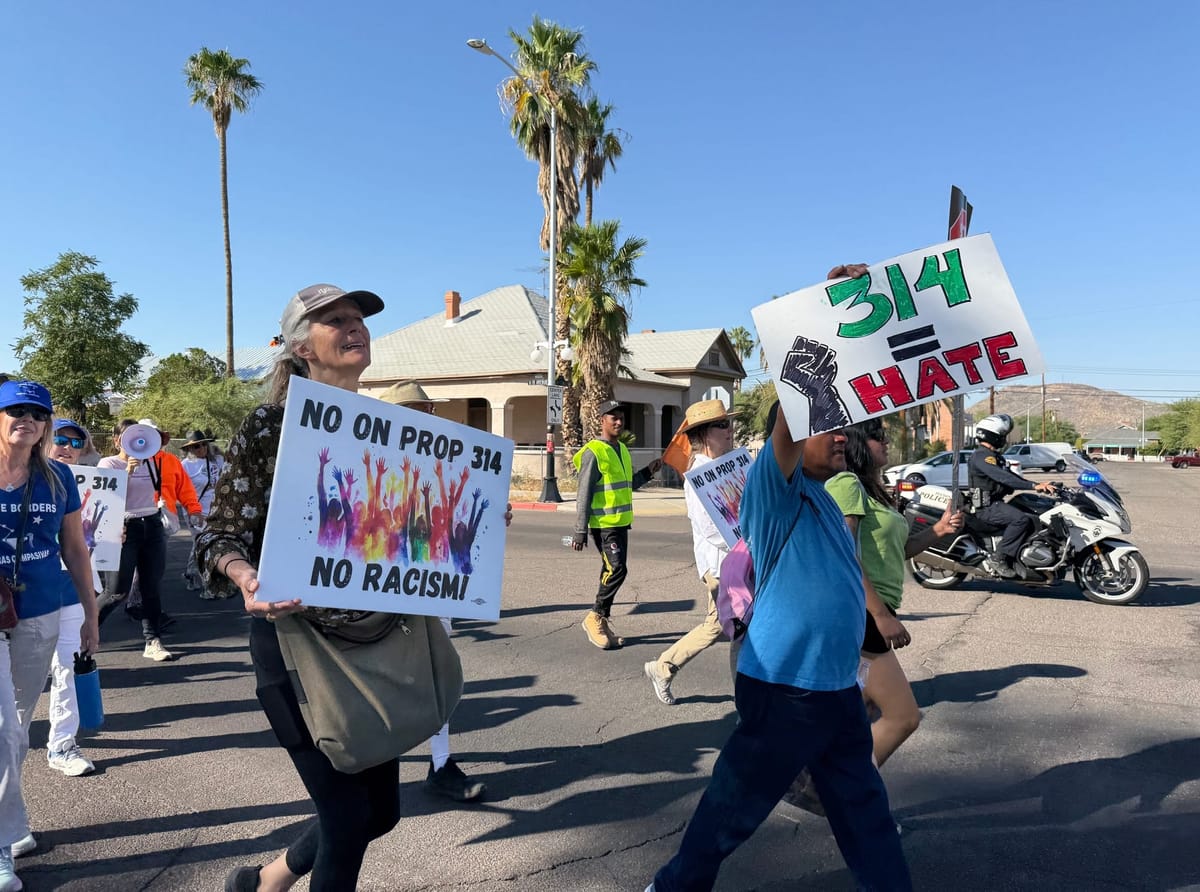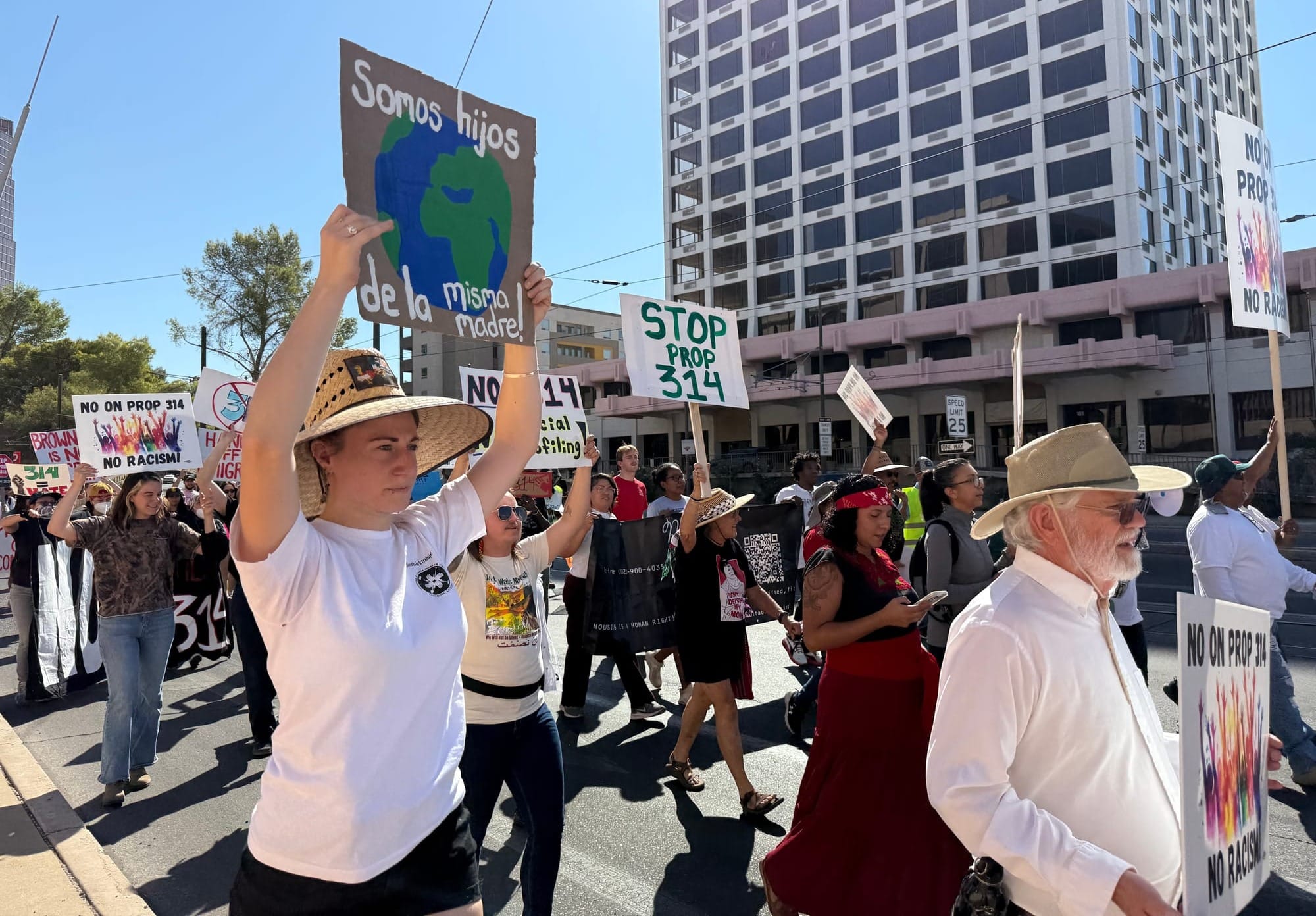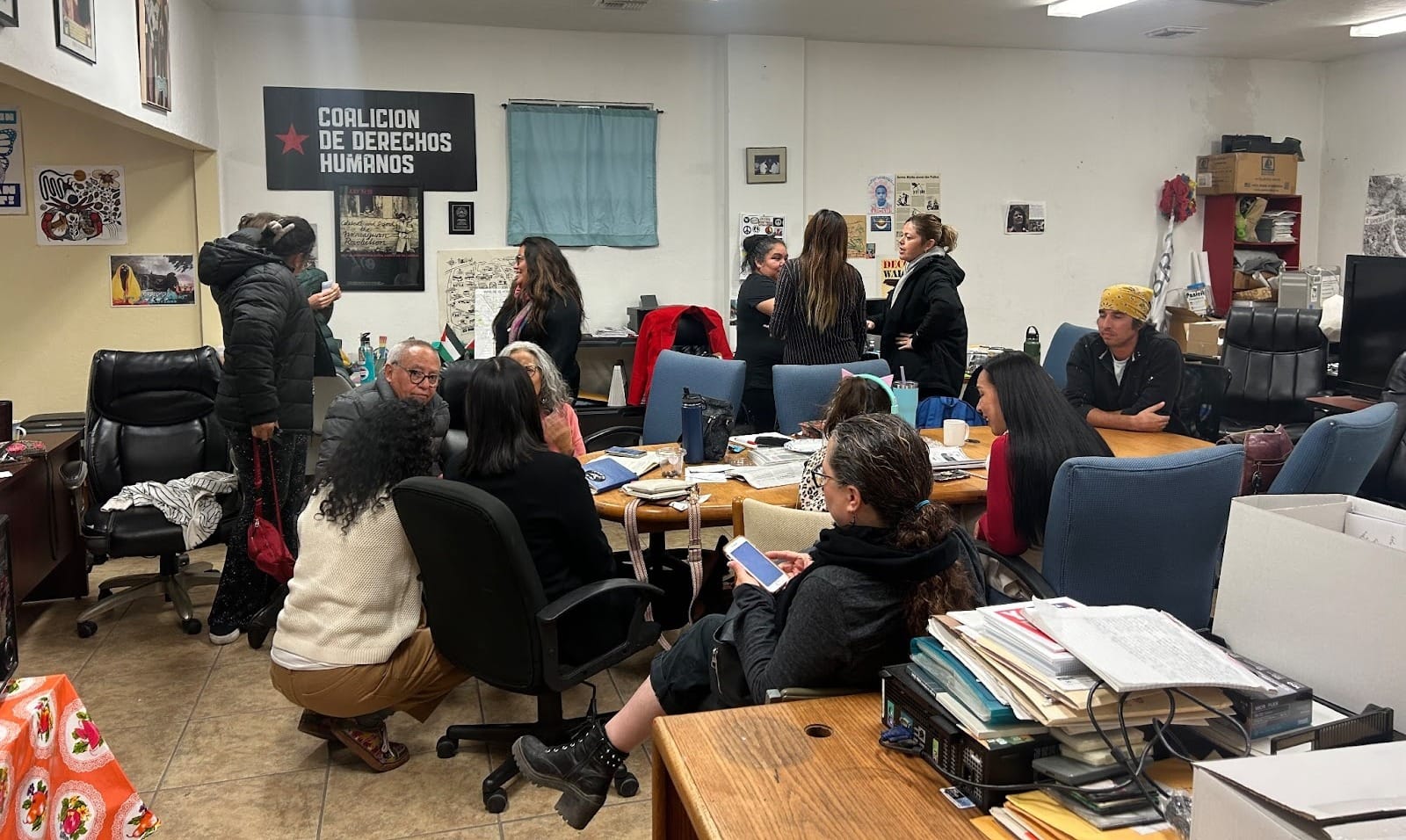Prop 314's passage sparks concern in Tucson's Latino communities
Opponents have likened Proposition 314 to SB1070, a 2010 state law that empowered local law enforcement to ask for immigration papers from anyone they suspected of being undocumented.

Members of Tucson’s Hispanic community say they're feeling scared in the wake of strong voter approval for a ballot proposition that makes unauthorized immigration a state crime.
Opponents have likened Proposition 314 to SB1070, a 2010 state law that empowered local law enforcement to ask for immigration papers from anyone they suspected of being undocumented.
It also allowed them to arrest anyone believed to be a deportable immigrant without a warrant.
Prop 314 has earned 63% of the vote, with an undetermined number of outstanding ballots. The ballot language said the proposition was related to “responses to harms at the border.”
Opponents say it will harm Latino and brown communities. Proponents say it will protect Arizonans and stop depleting state resources used on and by undocumented people.
“These next couple of years will be very scary for undocumented residents in Arizona,” said Allan Colbern, an immigration expert at Arizona State University. “If this law goes into effect … local law enforcement throughout the state will be required to enforce immigration law. And I imagine this would be not just at the border, but throughout the entire state.”

Prop 314 has three main points:
- It makes it a state crime for noncitizens to enter the state between ports of entry and allows state and local police to arrest noncitizens who cross the border unlawfully.
- It requires people to verify their citizenship status when enrolling in financial aid or public welfare programs and makes it a felony for people who submit false information.
- It makes the sale of fentanyl a Class 2 felony if the person knowingly sold fentanyl and it results in the death of a person.
While the first point is not yet enforceable, the ACLU has said that the second two points will be enforced by November 25.
Isabel Garcia, co-founder of Coalicion de Derechos Humanos, called Prop. 314 legalized racial profiling and said it will have dangerous implications.
“It’s going to put a target on all of us,” she said. “You're not going to see the police officers up in northern Arizona coming down to the border to see who entered illegally. What they will do is they'll come across some of those workers that exist there in Flagstaff and ask them, ‘How did you come in?’”
Both Garcia and Colbern said the law would have huge ramifications for communities across Arizona, not just near the border, and Garcia is already preparing to mobilize.
Leading up to the election, Derechos Humanos led an effort to inform people about Prop 314 and encourage them to vote against it. They staged a protest, held weekly informative meetings and spread the message on social media.
“They’re wrong if they think we’re not going to fight back,” Garcia said. “We’re not going to take anti-human measures, we won’t accept anti-human measures being placed on anybody, that’s the bottom line. We’re going to fight you all the way (and)] we’re going to have a massive resistance.”
In 2018, reproductive justice and migrant rights activist Alejandra Pablos was re-detained by Immigration Customs Enforcement. She was held for 43 days before being granted bond and brought home, after communities nationwide organized on her behalf.
She’s not unfamiliar with the fight for her right to stay in the U.S.
Prop 314 “is going to organize all our energy to go and stop it, when we could just be doing other things that people that don't get criminalized by the police do every day, like, live their lives and be with their families,” she said. “We don't get to do that. We have to organize to save our lives.”

Prop 314 is modeled after SB4, a Texas law that is working its way through the courts due to questions about its constitutionality. Since the federal government controls the enforcement of federal immigration law, the court is deciding whether the state can criminalize, enforce and deport immigrants.
A bipartisan border bill was introduced in Congress earlier this year that would have created stricter border enforcement. Nearly all Republicans voted against it after President-elect Donald Trump opposed it.
“The Biden Administration has failed to secure our southern borders,” Joel Strabala wrote in an argument urging voters to support Prop 314. “Therefore, Arizonans must secure our state’s southern border.”
Right now, both SB4 and Prop 314 are on pause in Texas and Arizona, pending the court’s decision. But that’s not bringing opponents any comfort.
“If the court rules that SB4 is Constitutional, we would see the next day Arizona start to enforce Prop 314,” Colbern said.
He thinks a decision won’t come until next year, under the Trump administration. And he predicts that an organization like Living United for Change in Arizona or ACLU will take the proposition to court to block it again here in Arizona.
In a statement released Wednesday, LUCHA vowed to stand strong and “keep fighting for immigrant families, economic justice and the freedoms that Trump’s administration seeks to strip away.”
Similarly, in a statement released on Thursday, the ACLU affirmed that it “will consider all options to prevent the implementation of this unconstitutional and harmful law.”
“Proposition 314 will not fix the flaws in our immigration system, nor ‘secure the border’ in the way its proponents have represented,” said Noah Schramm, border policy strategist for the ACLU of Arizona. “What it will do — if the courts ever allow it to stand — is break families apart, exacerbate racial profiling, and increase criminalization of immigrants and communities of color.”

Migrant rights activist Pablos points to the lack of politicians speaking against Prop 314 as one of the reasons it passed.
“I haven't seen the governor talk about protecting us or anything like that, I haven't seen a lot of politicians locally protect (us,)” she said. “We had to force (Tucson Mayor) Regina Romero to come out and speak out against Prop 314. That's not enough. That's why this passed.”
Though Gov. Katie Hobbs spoke out when Prop 314 was working its way through the legislature, she has not issued a statement regarding Prop 314.
A spokesperson for the governor said that she’s repeatedly shown that she will work “with anybody to take action to actually secure our border and protect the rule of law, not attack Arizona’s communities.”
Pablos also blames the Spanish-language media for not covering this issue in a comprehensive manner, saying people and organizations now have to take on the burden to inform the community. The media fails to contextualize why people migrate to the U.S., Pablos said.
“We know the U.S. has been infiltrating other countries and causing more people to migrate,” Pablos said. “And the other part is, if people want to migrate, they should.”
Garcia and Pablos were both in attendance at Derechos Humanos’ weekly meeting on Thursday, the first since the passing of Prop 314.
The room was filled with attendees, leaving more than 30 people standing in the small oom.
Organizers were focused on mobilizing efforts through educational events, support programs and dissemination of information.
The group is hosting an assembly for immigrants impacted by Prop 314 Saturday, November 23 at Southside Presbyterian Church. Organizers said attendees can expect information about the new law, what will be immediately in effect, and their rights.
Derechos Humanos is also planning a town hall on December 7 to connect people, organizations and businesses that want to join the movement.
Prop 314, in combination with the re-election of Trump, has instilled fear in the lives of immigrants and undocumented people, as some attendees at the meeting mentioned.
One attendee spoke about creating a detailed plan in case something were to happen to them or their partner, which included having a file with relevant records that would aid them, and a friend who they can depend on to live with temporarily.
They suggested this as a practice that could be helpful for families who might have to deal with a family member being detained or deported.

In trying to understand how Latinos may feel about the passing of this proposition, Tucson Spotlight headed to El Super, a market on Tucson’s south side.
Many asked that their names not be published.
One woman, who is in the naturalization process, said she didn’t think the proposition would pass, but she fears for the future of herself and her family.
A couple, who both said they voted against it, talked about marching in protest of SB 1070 years ago, traveling all the way to Phoenix to protest the law.
While the husband doesn’t think Prop 314’s passage will affect him or his family, he said he will still march against it if he hears of a protest, and mentioned the need for Spanish media to do their part in informing the community about these types of events.
This same couple also said they voted for Trump because they support deporting people who are here without documents.
Another man said he voted yes on Prop 314 because of the fentanyl aspect, saying he believed it would “curb” the sale of fentanyl to places other than Tucson. He recognized that including the fentanyl point into the proposition was “un gancho” (a hook), but still voted for it because he doesn’t think people should be able to sell fentanyl at all.
He says that he hopes that this encourages “la gente mala” (the bad people) who sell fentanyl to go elsewhere.
Fentanyl was a concern for others, including Jaime, who came to the U.S. from Cuba two years ago.
“Two people died yesterday of a fentanyl overdose right over there,” Jaime said, pointing to the street corner outside of El Super’s parking lot.
Jaime said that while he understands the need to reduce drug abuse, this proposition is not the answer.
“It is anti-human … because people are fleeing their countries due to many reasons,” he said. “How are you going to give the right to a police officer who is not an immigration officer to then have the right (to act as an immigration officer.) It's like creating a dictatorship.”
He said the government needs to provide a path to citizenship for law-abiding people who have been living and working in this country for years.
“This will be really harmful and unjust. There’s a large, restrictive move (nationally), and I think it’s the wrong move for our country,” said ASU immigration expert Colbern. “We need to find a better way to provide pathways for immigrants to become legal residents, to have a pathway to citizenship.”
Susan Barnett is Deputy Editor of Tucson Spotlight and a graduate student at the University of Arizona. She previously worked for La Estrella de Tucson. Contact her at susan@tucsonspotlight.org.
Tucson Spotlight is a community-based newsroom that provides paid opportunities for students and rising journalists in Southern Arizona. Please support our work with a paid subscription.



